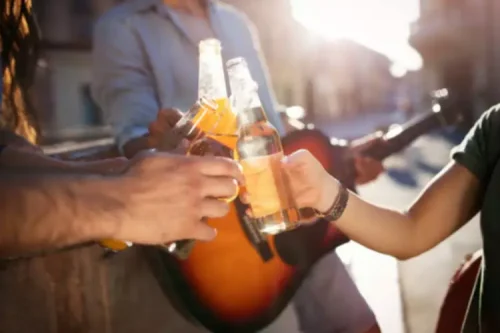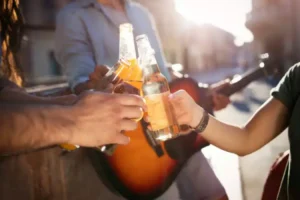Alcohol intolerance Symptoms & causes

One of the most common signs of alcohol intolerance is reddening of the face, which happens when “people are missing a key enzyme needed to break down alcohol,” Dr. Elliott says. “This results in flushing of the face, and feeling the symptoms of alcohol intoxication with lower amounts of it.” Excessive acetaldehyde can lead to sickness, an irregular heartbeat and the aforementioned facial flushing. Taylor notes that sometimes an alcohol intolerance is the result of genetics. If a certain drink (or several) doesn’t agree with you, then steer clear. It’s pretty normal to feel ropey the day after drinking alcohol (especially as so many of the most popular hangover cures are actually myths, sorry).
What are the symptoms of an alcohol allergy?
The material on this site is for informational purposes only, and is not a substitute for medical advice, diagnosis or treatment provided by a qualified health care provider. If you have to sneeze, cover your nose and mouth with a tissue. If you can’t grab a tissue quickly, sneeze into your upper sleeve, not your hands. Then, wash your hands with soap and water before touching another surface.
Health news and tips for the whole family
Alcohol intolerance is caused by a genetic condition in which the body can’t break down alcohol efficiently. The only way to prevent these uncomfortable reactions is to avoid alcohol. If you’re looking for a way to prevent sneezing when you drink, try making your cocktails with fresh fruit juices instead of using pre-made mixes. This will help reduce the number of histamines in your drink and make it less likely to trigger a sneeze. If you find that warm drinks make you sneeze, try chilling them before you drink them. This will help to soothe the mucous membranes in your nose and prevent them from swelling and triggering a sneeze.

Final Thoughts on Why You Get a Stuffy Nose After Drinking

However, a person is usually allergic or intolerant to certain ingredients in the drink, rather than the alcohol itself. Occasionally, a doctor may ask a person to consume alcohol in a medical setting and observe any reactions or symptoms. A skin prick test should take place in a medical setting in case of a severe allergic reaction. The healthcare professional uses a lancet to pierce a person’s Alcoholics Anonymous skin and apply a small amount of the suspected allergen to see if it causes a reaction. However, standardized skin testing using different types of alcohol is not currently available.
unny Nose
A sneeze happens when something like mucus, a tiny object, or an allergen interacts with skin or the tiny hairs that line your nose. This article is not intended to be a substitute for professional medical advice or diagnosis. Always seek the advice of your physician or other qualified health provider with any questions you may have regarding a medical condition. The amounts of histamine vary between wines, but generally, there is more histamine in red than white wine. Anaphylaxis is a life threatening condition that involves a series of symptoms, such as a rash, low pulse, and shock. An alcohol allergy occurs when the immune system overreacts to alcohol entering the body.
- As we now know, alcohol intolerance is an issue with metabolizing alcohol — not an overzealous immune system.
- If you find that certain drinks trigger your sneezing, try switching to a different type of alcohol.
- To avoid a reaction, avoid alcohol or the particular substance that causes your reaction.
- Alcohol intolerance is a temporary, but pretty uncomfortable, reaction to alcohol — with nasal congestion and flushed skin being the two most common side effects.
This can happen because alcohol dilates blood vessels, making skin appear more flushed. It can also happen in people who have a genetic defect in the aldehyde dehydrogenase 2 (ALDH2) gene. People with this defect aren’t able to metabolize alcohol as quickly as others, which leads to a buildup of a compound called acetaldehyde that is known to cause skin flushing.
This will help to reduce the number of histamines in your system and make it less likely that they’ll trigger a sneeze. If you find that certain drinks trigger your sneezing, try switching to a different type of alcohol. For example, if wine makes you sneeze, try drinking vodka or gin instead. Likewise, if beer makes you sneeze, try drinking vodka or gin instead. And if cocktails make you sneeze, try making your own with fresh fruit juices instead of pre-made mixes. This dilation occurs first in the brain, so you may feel flushed or warm after only a few sips of alcohol.

How To Handle Sneezing if It Happens
Some people may be at risk of alcohol overdose after just a few drinks, especially if they are young, small, or do not often drink. Because alcohol changes the way the brain processes information, it also makes it difficult for people to make suitable decisions or assess their own behavior. For example, people who are very drunk might underestimate how intoxicated they are. According to the 2015 National Survey on Drug Use and Health, 70.1% of adults in the United States report drinking alcohol during the past year. Closing your eyes when you sneeze is an automatic reflex reaction.
Other chemical irritants that can drunk sneezing cause sneezing include strong odors, perfumes, foods, and tobacco smoke. These triggers cause non-allergic rhinitis, as there are no allergic antibodies behind the symptoms. A person experiencing a severe allergic reaction should go to the emergency room immediately.
- This genetic condition means that you experience negative symptoms when drinking alcohol because your body is unable to process it properly.
- When you experience stress, your body releases hormones and chemicals, including histamine.

When these are present, you may experience more frequent sneezing as the body works to remove the fluids. Read on to uncover the science behind the stuffy nose phenomenon as well as key strategies to prevent it from becoming an inevitable side effect of drinking alcohol. Although not a true allergy, in some cases, what seems to be alcohol intolerance might be your reaction to something in an alcoholic beverage — such as chemicals, grains or preservatives. Combining alcohol with certain medications also can cause reactions. If you find that certain foods make you sneeze, such as strawberries or shellfish, try avoiding them before you drink.
Posts relacionados

